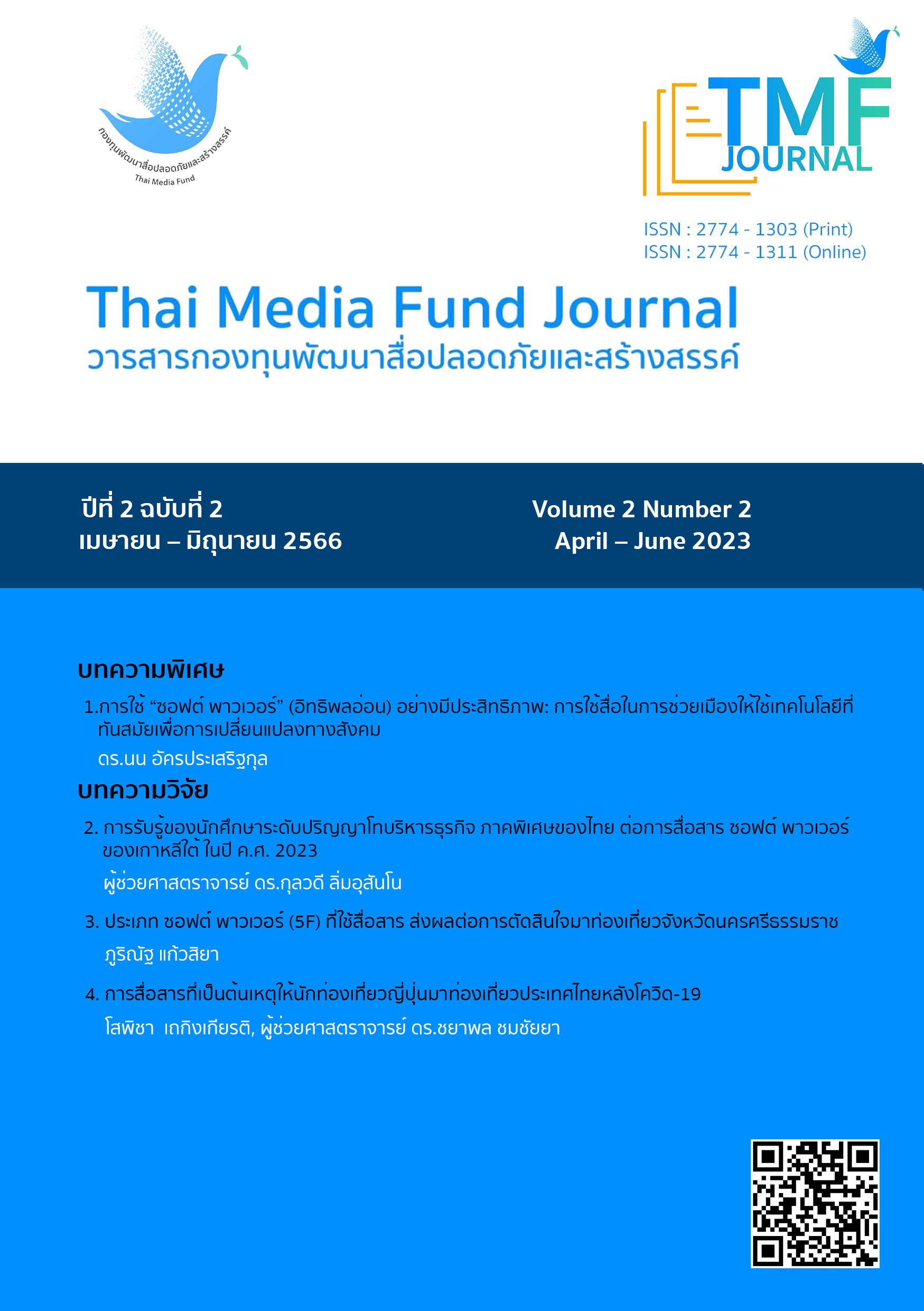การสื่อสารที่เป็นต้นเหตุให้นักท่องเที่ยวญี่ปุ่นมาท่องเที่ยวประเทศไทยหลังโควิด-19
Main Article Content
บทคัดย่อ
บทความวิจัยนี้มีวัตถุประสงค์ เพื่อศึกษาหาชนิดสื่อ และประเด็นเนื้อหาในการสื่อสารของของไทย ที่นักท่องเที่ยวญี่ปุ่นตัดสินใจมาเที่ยวประเทศไทยหลังโควิด-19 เป็นการวิจัยเชิงคุณภาพ สัมภาษณ์นักท่องเที่ยวญี่ปุ่นที่มาท่องเที่ยวประเทศไทย จำนวน 10 คน โดยมีกำหนดคุณสมบัติต้องเป็นนักท่องเที่ยวที่มาท่องเที่ยว ในปี พ.ศ. 2565 และ พ.ศ. 2566 งานวิจัยพบว่า สื่อที่คนญี่ปุ่นติดตามการท่องเที่ยวประเทศไทย ได้แก่ Youtube ในลักษณะเสียงพูดเสียงบรรยายใน Youtube เป็นภาษาญี่ปุ่น และเนื้อหาหรือประเด็นในการสื่อสารออกไปในลักษณะ Soft Power ได้แก่ การที่นักท่องเที่ยวญี่ปุ่นชอบอาหารไทย ผัดไทย สินค้าที่ทำจากแฮนด์เมด วันสงกรานต์ การตีกอล์ฟ นวดแผนไทย มวยไทย และลักษณะการใช้ชีวิตแบบง่าย การค้นพบนี้มีประโยชน์สามารถไปสื่อสารกับนักท่องเที่ยวญี่ปุ่นให้มาท่องเที่ยวประเทศไทยมากขึ้น
Article Details

อนุญาตภายใต้เงื่อนไข Creative Commons Attribution-NonCommercial-NoDerivatives 4.0 International License.
เอกสารอ้างอิง
Boonsiriphan, M. (2020). Get to know new normal, royal institute council edition. Retrieved from http://thaipbs.or.th/ coronaVirus2019
Borisutsawat, P. (2016). Behavior of Japanese tourists in medical tourism. and Thai beauty. Retrieved from http://isas.arts.su.ac.th/wp-content/uploads/2557/geography/05540634.pdf
Chuaykerd, P. (2022). Thai food “Thai Soft Power to the World Soft Power”. Retrieved from https://rsdi.kku.ac.th/?p=2564
Lakphet, P. (2017). Classification of japanese tourists by analyzing techniques for psychological factor clustering, behavior, marketing and relationship models: Causal science, factors affecting the decision to choose thailand for a long stay. Chulalongkorn Business Review, 39(3), 20-58
MGR Online. (2019). Why are Japanese people not happy? Retrieved from https://mgronline.com/japan/detail/9620000081225
MGR Online. (2022). 6 Reasons that Japanese People Can't Speak English. Retrieved from https://mgronline.com/japan/detail/9650000058808
Morse, J. M. (1994) The cognitive processes of analysis in qualitative inguiry. In J. M. Morse (Ed.), Critical issues in qualitative research Methods (PP. 23-43). Thousand Oak, CA: Sage
Pananuluk, S. (2021). Economic success of virtual Youtube, Japan: Case study: Hololive. Bachelor of Arts thesis, Asian StudiesProgram, Faculty of Arts, Silpakorn University.
Royal Thai Government. (2021). The prime minister is ready to push Thai soft power to create value for the creative economy. creative economy is already in the BCG economic model, confident that Thai people have world-class skills and creativity. Retrieved from https://www.thaigov.go.th/news/contents/details/45753
Thiptianpong, K. (2016). Why do Japanese people like Thailand? Online manager newspaper. Retrieved from http://mgronline.com
Wonderfulpackage. (2023). 20 Thai products that foreigners like every time when they come and have to buy them back. Retrieved from https://www.wonderfulpackage.com/article/v/1199/


